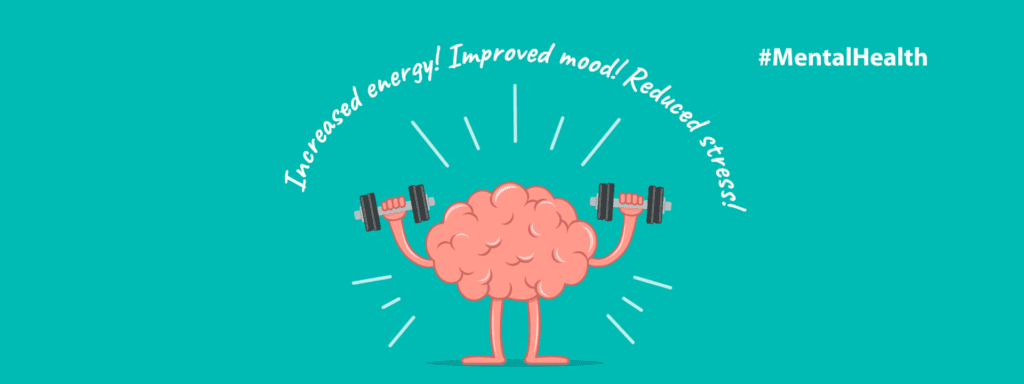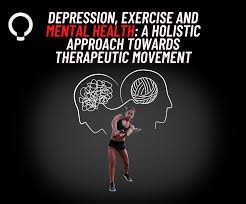
1. How Exercise Impacts Mental Health: The Science Behind It

Releasing “Feel-Good” Chemicals
When we exercise, our bodies release endorphins—natural mood elevators. These chemicals work like natural painkillers, helping alleviate feelings of stress and creating a sense of well-being. Exercise also increases levels of serotonin and dopamine, neurotransmitters associated with happiness and relaxation.

Reducing Stress Hormones
Physical activity helps lower levels of cortisol, the body’s primary stress hormone. High cortisol levels are associated with anxiety, mood swings, and even depression, so lowering them can lead to a calmer, more relaxed state of mind.
Impact on Brain Health
Exercise promotes the growth of new neurons and enhances connections between brain cells. These changes help protect against cognitive decline, supporting memory, focus, and emotional resilience. Regular activity can also slow age-related brain degeneration, boosting overall brain health.
Impact on Society: Understanding the scientific benefits of exercise encourages a proactive approach to mental wellness, helping people adopt healthier lifestyles that improve both mind and body.
2. Mood-Boosting Effects of Regular Exercise

Improved Sle ep Quality
Exercise has a profound effect on sleep quality. Good sleep is essential for mental well-being, and studies show that people who exercise regularly fall asleep faster, enjoy deeper sleep, and wake up feeling more refreshed. This cycle of good sleep and regular exercise creates a positive impact on overall mood and reduces feelings of stress.
Enhanced Self-Esteem
Engaging in regular exercise can improve self-esteem and body image. As fitness goals are met, feelings of accomplishment and confidence increase, boosting self-worth and promoting a positive self-image. This effect is especially beneficial for individuals struggling with self-doubt or body image issues.
Social Interaction
Group exercises, fitness classes, and team sports provide opportunities for social interaction, which is crucial for mental health. Building a support system through shared activities can reduce feelings of loneliness, enhancing emotional resilience and providing additional motivation to stay active.
3. Reducing Anxiety and Depression Through Physical Activity

Exercise as a Natural Antidepressant
Exercise has been found to be as effective as medication for some people with mild to moderate depression. Physical activity promotes brain changes that contribute to reduced depression symptoms, including increased neural growth and reduced inflammation, which impact mood regulation.
Alleviating Anxiety
Exercise can also help manage anxiety by increasing mindfulness, releasing tension, and providing a natural distraction. Activities that require focused movement, like yoga or tai chi, are particularly effective at relieving anxiety, as they combine physical exercise with meditative practices.
Impact on Society: Exercise offers an accessible, natural remedy for managing mild depression and anxiety, providing people with non-medical options for boosting their mental health.
4. Combining Mindfulness with Exercise for Enhanced Mental Health
Mindful Walking
Walking mindfully—focusing on each step, breath, and movement—can be a relaxing way to integrate mindfulness into your daily exercise. Mindful walking encourages connection with the environment and enhances focus, grounding you in the present moment.
Yoga for Mental Clarity

Yoga combines movement with deep breathing and mindfulness, offering a complete mental health workout. Through poses, meditation, and breathwork, yoga reduces stress, improves flexibility, and promotes a calm mind, making it an excellent choice for mental well-being.
Breathwork During Workouts
Practicing mindful breathing during any workout—whether lifting weights, running, or cycling—improves focus and increases oxygen intake. Conscious breathing can help calm the mind, making workouts more effective and mentally rewarding.
5. Tips for Building a Mental Health-Boosting Exercise Routine
Choose Enjoyable Activities

Exercise doesn’t need to be intense to boost mental health. Activities you enjoy, such as dancing, gardening, or hiking, are just as effective at reducing stress. Choose activities that feel good to you to create a sustainable exercise routine.
Set Achievable Goals
Setting small, realistic goals can provide a sense of accomplishment and motivation. Goals help track progress and keep you engaged, which is especially helpful during challenging periods.
Exercise Outdoors
Spending time outdoors while exercising has been shown to boost mood and reduce stress more than indoor workouts. Sunshine and fresh air amplify the mood-boosting effects of physical activity, so try to fit in outdoor walks, runs, or cycling sessions when possible.
Be Consistent
Regularity is key for mental health benefits. Aim for at least 150 minutes of moderate exercise per week. Consistency, rather than intensity, helps maintain positive effects on mood and stress levels.
Conclusion
Regular exercise is one of the best ways to support mental health. From reducing anxiety to improving mood, physical activity offers numerous mental health benefits that enhance overall well-being. By incorporating mindfulness and finding activities you enjoy, you can create a workout routine that’s as mentally rewarding as it is physically beneficial. Kenyan Chronicles encourages you to start small, stay consistent, and embrace the transformative power of exercise for a healthier mind and body.






